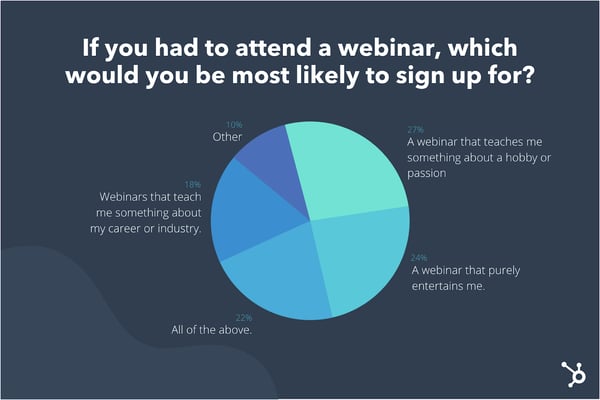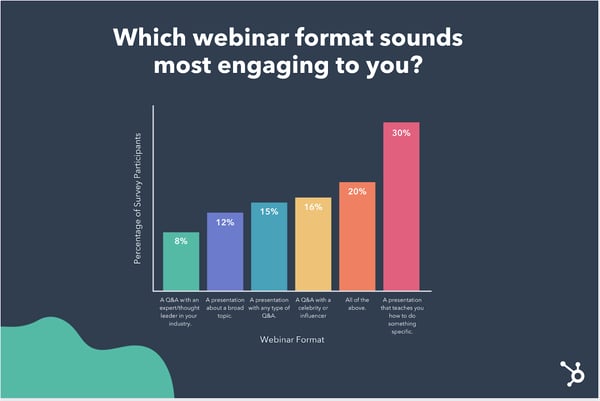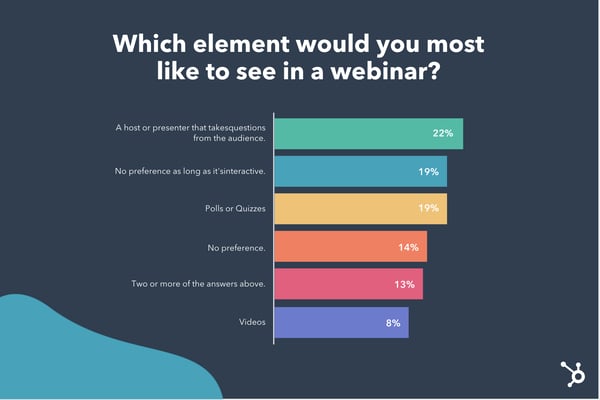In 2020, brands are leveraging virtual events more than ever.
And, although some marketers once believed that "webinars were dead,” many are now rethinking that statement as they find themselves scheduling and promoting this exact type of event.
Webinars, or online events often modeled like a class or seminar, often include a lesson, slide deck, interactive elements such as polls, and, occasionally, time for audience members to virtually ask questions.
Because of their educational format, webinars can offer a number of great perks to brands.
First, you can build a sense of credibility by hosting a webinar on a topic your company has expertise in. Second, webinars can enable your fans to interact with you digitally.
Lastly, and most importantly, webinar signups can lead to a bigger contact list, more prospects, or purchasing conversions.
But webinars aren't always easy to plan and execute.
Because webinars require viewers to sign up and remember to tune in, it takes clever marketing to ensure that a large audience actually attends. Additionally, with most brands going virtual in 2020, a number of competitors in your space might very well be planning a similar webinar that your audiences might be more drawn to.
Luckily, by researching your target audience, and learning more about what drives attendees to sign up for webinars, you can create and promote an event that effectively pulls in and delights your audiences.
So, where do you start?
To help you research the best webinar tactics for your brand, I surveyed 400 consumers about their webinar preferences and what motivates them to attend these virtual events. In this blog post, I'll highlight a few key findings that you can keep in mind as you develop and promote your webinar content.
What Consumers Say About Webinars in 2020
People want webinars that help them explore their passions.
When choosing which webinars to sign up for, are people drawn mostly to events that help them elevate their career, or are they attending them for more recreational purposes?
To learn more about consumers' motivations for attending a webinar, I asked 400 consumers, "Which webinars are you most likely to attend in 2020?", 27% chose, "Webinars that teach me more about a passion or hobby;" while 24% chose, "Webinars that entertain me."

If you have a webinar strategy or series that aims to help people boost their careers or work tactics, don't panic. Nearly one-fifth of the group (18%) said they wanted to attend webinars that helped them learn more about their career or industry, while 22% said "All of the above." These results indicate that consumers will definitely still sign up for a webinar that tackles career, work, or industry-related topics.
Additionally, you should also keep in mind that this survey was delivered to a small general consumer pool of all ages and career levels. Had this been given primarily to executives or B2B business reps, the results might have leaned towards industry-related content.
Regardless of what industry you're in, or the size of this survey pool, marketers should keep the data above in mind when creating and promoting a webinar. Because people are naturally curious and want to learn, your webinar promotions should intrigue them by clearly stating what they'll learn, noting any experts that might be featured, and highlighting how attendees will be able to use the knowledge they'll gain from the event.
Webinar viewers sign up to learn something -- but prefer certain teaching styles over others.
Just like any in-person class, each professor -- or webinar host -- might have a slightly different teaching style.
While some hosts might come in with a great slide deck presentation, others might bring in an expert and have the audience ask them questions. Or, they might bring in a few experts and host a panel discussion where the audience just listens rather than asking questions.
There are many ways to format an informative webinar, but which teaching style actually intrigues people enough to get them to sign up?
When I asked, "Which webinar format sounds most engaging to you?", 30% of participants said, "A presentation that teaches me how to do something specific." Meanwhile, 20% said "All of the above."

The results above hint that a simple how-to webinar with fewer frills could still engage audiences if you're feeling low on bandwidth and creativity. However, if you have the time to coordinate a webinar that feels more like a live Q&A, this could also be a great formatting option. 39% of people said they were drawn to one of the webinar formats that included a Q&A.
Although a more basic presentation or lecture styled webinar will still catch the attention of potential viewers, content marketers should still make sure their presentations educate audiences on something specific -- like a strategy -- rather than discussing an incredibly broad or very vague topic -- like an entire industry. Only 12% of respondents say they're driven to webinars that will feature a presenter discussing a broad topic.
Odds are, a person attending a webinar already knows the basics of their hobby, industry, or passion. But, they want to learn more or become an expert at something related to it. For example, as a content marketer, I might not attend a webinar with a broad topic of "Marketing," but I might attend webinars like, "Advanced Blogging Tips from Managing Editors," or "The Basics of SEO in Marketing."
As a marketer or webinar creator, you'll need to build a buyer persona for your target audience to determine the best expertise level to create valuable content around. If your audience is filled with beginners in a topic, you might want to create more granular webinars that discuss basic tasks or tactics. If your audience is made up of topic experts, your webinars might need to be more advanced.
Interactive Content: The Key to an Engaging Webinar?
In the modern classroom, teachers will often zest up a number of different class outlines by adding opportunities for students to interact or test their knowledge. These could include polling the class by asking them to raise their hands, pop quizzes, or allowing them to ask questions.
When it comes to online events, a number of tools and video software enable marketers to make their webinars more interactive and engaging. And, based on our research, it seems like consumers enjoy interactive webinars.
When asked, "Which element would you most like to see in a webinar?", "A host or presenter that takes questions from the audience," received 22% of the votes, followed by "No preference as long as the webinar feels interactive," with 19% of the votes. Another 20% say they'd like to see polls or quizzes.

If you're a marketer who regularly creates webinars, it might be worth it to consider where you can make your programming more interactive.
For example, if you're hosting an expert, consider leaving time for the audience to ask questions in the webinar tool's chat area. Or, if you're discussing a strategy that's common in your field, poll your audience to see if they've used the tactic.
Although polls or Q&A might seem like a super basic webinar element, they might make your audiences listen more actively and enjoy the content they're consuming more. This ultimately could lead to them engaging more with your brand, signing up for future webinars, or converting to a customer.
If you're marketing a webinar that has interactive content in it, be sure to promote that aspect. For example, in your messaging, emails, and follow-up emails, directly tell your audiences they'll be able to actively participate in quizzes, polls, or a Q&A during your event.
In a competitive webinar pool, anything you can do to make your webinar seem more active and engaging than others that are more basic could help boost signups and attendance during the actual event.
Creating and Promoting a Successful Webinar
While creating a unique and engaging webinar will be one crucial step in your virtual event strategy, the proper promotional tactics will also be vital.
Once you've created a webinar plan that will inform audiences, allow them to interact with you, and fuel your contact list, be sure to promote all of the great things your online event will cover.
As you promote your webinar, don't forget to note aspects that will make your event stand out -- such as polls or Q&As. This transparency will show audiences exactly what they can expect and differentiate you from competitors with vague webinar promotions.
To learn more about creating a truly compelling webinar, check out this ultimate guide. Want to learn how to promote your next online event? Here are a few great tips from HubSpot marketers.
from Marketing https://ift.tt/3ic4cbX
via IFTTT
Comments
Post a Comment